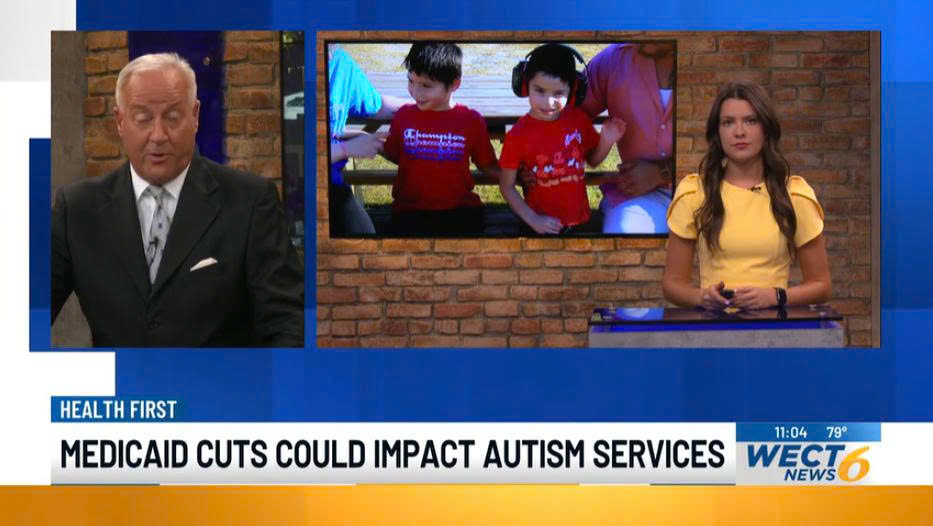‘It’s terrifying’: Proposed Medicaid cuts would impact services for kids with autism starting October 1
LELAND, N.C. – Gauge and Grayson are like any other five-year-olds living in Southeastern North Carolina.
They enjoy riding bikes, playing outside and being with their family. Just seeing them, you might not ever be able to guess that just a few years ago, neither spoke at all.
At two-and-a-half years old, their parents, Matt and Kristen Dupont, took them to a doctor who quickly diagnosed them with autism.
“We were very overwhelmed and underprepared for what autism brought to our family,” Kristen Dupont said.
They decided to take them to Behavioral Consulting for Autism in Leland. The first day, Kristen said she cried dropping them off, scared to leave her children with anyone outside of the family. Now, she says it’s their favorite place. They’ve grown both developmentally and socially, making several friends.
“Since coming here, we get to do regular family outings,” Kristen said. “We get to go places. We get to enjoy time with our kids and not have to worry about all the safety concerns that come along with autism.”
Her husband, Matt, agreed, saying it’s been a game-changer for their family.
“They worked with them and gave them a safe space and an environment to exceed and excel,” Matt Dupont said. “And now, one of them is in general ed and rapidly learning, rapidly growing to the point where he’s in advanced classes. And our other son is working towards all his goals.”
Through the center, they’ve grown in their confidence that one day their sons could be able to live fully on their own.
But they say none of it would be possible if not for Medicaid.
“Even with regular insurance for our two kids, we were looking at about $3,000 a month,” Kristen said.
With two other kids and Matt needing to stay home to take care of the twins and their special needs, Kristen said her single income as a schoolteacher never would have been able to get her boys the services they needed.
Behavioral analyst and site supervisor for Behavioral Consulting for Autism of Leland, Angelique Meyer, said many other families with autistic children have similar situations. About half of the families the center serves are on Medicaid.
Meyer says it makes proposed Medicaid cuts at the state level all the more concerning.
“October 1st, there’s going to be a 10% cut in reimbursement rates for ABA services,” Meyer said. “That has trickled down from the federal government’s cut to the Department of Health and Human Services. So, our state has determined the best way to cut that money from the budget was to cut a variety of Medicaid services, but mostly targeting ABA services.”
Meyer said the true impact of this will be felt at ABA centers across the state. She said some may have to take a limited number of Medicaid patients, and some may no longer accept Medicaid patients altogether. In a few cases, Meyer said some centers may even have to close their doors if the majority of their clients rely on Medicaid.
While she sees where the cost-cutting could help the government in the short-term, she says its long-term effects could wind up being more expensive than just fully funding Medicaid.
“Individuals who rely on these services to build skills, communication, social skills, adaptive lifelong skills that lead to independence and living fulfilled lives, what’s going to happen is as adults, they’re not going to have those skills,” Meyer said. “The amount of support that individuals would need as adults if they’re not given those as children is going to be substantial.”
Matt and Kristen say the news has been hard to cope with for them and many other parents at the center.
“It’s terrifying,” Kristen said. “There are very few resources as it is for people who have children with special needs, and balancing what I would call a normal life and having special needs children is really difficult. I worry long-term if these services are not available, we’re going to see a lot more adults long-term not being able to live on their own, not being able to contribute to society, and not only that, but have a negative self-reflection of themselves that they are not needed.”
Both Meyer and the Duponts say that national conversations around autism this week haven’t been helping.
“The information that’s coming out in the federal government is focusing on causation or potential causes of autism that may or may not have any medical backing. The problem isn’t just that information. The problem is the shift in focus. Instead of supporting children and adults with autism and looking at ways that we as a country can support individuals and families with autism, the focus is then shifted to almost a blame mentality. Who’s causing it? Who’s to blame for people having autism? That’s not really the shift that we want to see.”
The Duponts say they hope lawmakers will come up with a funding solution before it’s too late for the thousands of families who rely on Medicaid.
“If you’ve ever met somebody who has special needs, they will bring you a different joy and love than you have ever experienced in your entire life, and they are worth this funding,” Kristen said. “We get very little as special needs parents. Give us the little bit we can get because every little bit helps. It is a long, very stressful journey.”
